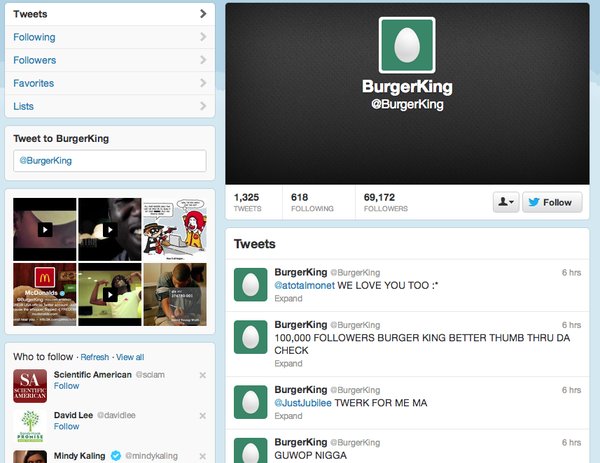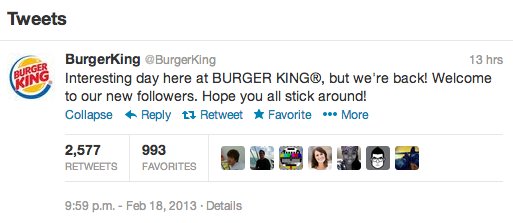Brands
After Hack, Burger King Needed a Brand Publishing Response
On Monday, Burger King found itself in social media crisis mode when its Twitter account was hacked.
The hackers changed the profile picture to the McDonald’s logo, and re-skinned the background with a picture of McDonald’s new Fish McBites (a sign that the hack was likely carried by a band of seafood-loving stoners). A new bio declared, “Just got sold to McDonald’s because the whopper flopped.”

At 11 a.m., the first hacker tweet came out, announcing: “We just got sold to McDonalds! Look for McDonalds in a hood near you.”
Things just got weird from there. Tweets that followed over the next hour included a shoutout to Chicago rapper Chief Keef — best known for illustrious rap sheet — and a threat to Wendy’s customers. (“if I catch you at a wendys, we’re fightin!”)
There was also an advertisement for bath salts, and a picture of a man injecting a dirty needle into his arm with the accompanying text, “We caught one of our employees in the bathroom doing this …”
At 12:15 p.m., after an hour and fifteen minutes, the account was suspended.
On Monday night, the Burger King account was stripped of any logo, bio or skin, and the offending tweets bizarrely remain up. Later in the evening, the account was restored, with the offending tweets erased, an new tweet that vaguely acknowledged the events. “Interesting day here at Burger King, but we’re back! Welcome to our new followers. Hope you stick around!”

One curious result of the hijacking was that the numbers of followers more than doubled overnight. As of Tuesday at noon, the number of followers had climbed to more than 112,000.
Since the hack, Burger King has been quiet outside of a bland PR statement that read: “We have worked directly with administrators to suspend the account until we are able to re-establish our legitimate site and authentic postings.”
Their Facebook account has been silent since tweeting a $0.25 coupon for coffee this morning.
As Burger King tried to return to business as usual, the rest of the Internet was busy tweeting and posting countless jokes and memes about the hack. It ended up being the web’s water cooler gossip of the day, but it felt like Burger King was stalling, wondering about how this darn social media thing went wrong.
A strong brand publishing platform and culture would have come in handy. After the hack, Burger King’s best strategy would have been to deftly communicate what happened with the hack, and then join in on all the memetacular fun. They already had the blogosphere’s attention; if Burger King would have landed a few good jokes on one of its other social media platforms, it would have been a big win for their social media efforts.
There, however, lies the catch: you can’t successfully respond at a pace that keeps up with the rest of the Internet unless you have an always-on content marketing culture in place. If you have a team in place creating content every day, they can respond in real-time. You can see this in how Oreo’s command team allowed it to capitalize immediately on the Super Bowl blackout.
Burger King got hacked and it was really, really weird. There are many jokes to be made. Discussions about cyber-security to be had. Brand publishing is what allows you to do all those things.
Get better at your job right now.
Read our monthly newsletter to master content marketing. It’s made for marketers, creators, and everyone in between.




